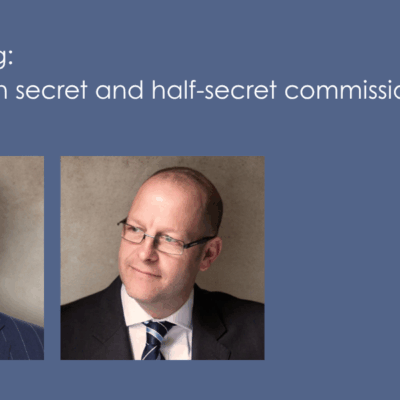
Stephen Baister, Katherine Hallett and Matthew Marsh take a look at whether and how mediation works in relation to the existing insolvency legislation.
Introduction
The question of the suitability of mediation in insolvency litigation still arises, even though it has established itself for some years now as a tool for the settlement of insolvency cases. Why?
Nature of insolvency proceedings: class proceedings
The first reason is the nature of insolvency proceedings. They differ from much other litigation because insolvency proceedings are often not concerned simply with the interests of two opposing factions. Even when they are, they remain class proceedings, although often below the surface rather than obviously so. The concept of insolvency proceedings as a class remedy is a consequence of the collective nature of the proceedings, although it is not mentioned expressly in the legislation.
In Re a company (No 001573 of 1983) [1983] BCLC 492,Harman J described it like this (at p.495):
“On a petition in the Companies Court in contrast with an ordinary action there is not a true lis between the petitioner and the company which they can deal with as they will. The true position is that a creditor petitioning the Companies Court is invoking a class right…and his petition must be governed by whether he is truly invoking that right on behalf of himself and all others of his class rateably, or whether he has some private purpose in view.”
Whilst a winding up or bankruptcy petition may be the most obvious manifestation of that class principle, it permeates the whole of insolvency. Thus, a person who challenges an office-holder’s decision in her capacity as a creditor must act in accordance with the interests of the class, not simply in her own personal interests. In Lock v Stanley and Edengate Homes (Butley Hall) Ltd [2021] EWHC 2970, when Mrs Lock challenged the liquidator’s decision to assign a misfeasance claim brought against her and other connected parties, relief was refused because (para.40): –
“It is obvious from the Application itself and the overall context in which it was made, together with Mrs Lock’s two witness statements in support of the Application, that her interests are not aligned with the interests of the creditors as a whole and her real complaint is with the pursuit of the substantive claims in the Main Proceedings against herself and her family rather than the contractual arrangements between the Liquidator and [the assignee].”
The decision was upheld on appeal at [2022] EWCA Civ 626.
In Re Longmeade Ltd [2016] EWHC 356, Snowden J made the generality of the class proposition clear, in the context of apparently perverse creditor behaviour, as follows (para.52: –
“Liquidation is a class remedy to be conducted in the best interests of the general body of creditors as a whole. If creditors are not promoting a view based upon their capacity as such, but are doing so as the result of extraneous factors which are not shared by, or are even contrary to the interests of the remainder of the class, then such views should be discounted or not given effect.”
Office-holder’s position as fiduciary
The second reason why some may question whether mediation is suitable in insolvency litigation is that the office-holder (the most common applicant), whilst often bringing proceedings in his own name or as agent of the company in respect of which he has been appointed, does so as a fiduciary i.e. on behalf of the creditors (or members) in whose interests he must act. (For a discussion on the office-holder as fiduciary see Mirror Group Newspapers plc v Maxwell (No 2) [1998] 1 BCLC 638 (‘Maxwell’): although the case dealt primarily with office-holders’ remuneration, it remains an important statement on the nature of insolvency offices). In this crucial respect, an office-holder is not simply acting in his own commercial interests, as most parties to litigation are entitled to do.
Should these reasons militate against mediation in insolvency proceedings?
These features of insolvency proceedings need not be an obstacle to mediation: indeed, in many circumstances, they will militate in favour of it.
Many other parties bring claims in a fiduciary capacity. Trustees bring a wide variety of claims in the interests of the beneficiaries whose interests they represent. Personal representatives of a deceased do so as well. Provided they bear in mind the capacity in which they are acting and the attendant duties, mediation may be as proper a course to take as full-blown litigation. Ultimately, office-holders are expected to use good judgment and to make commercial decisions. They do this all the time when they deal with assets in a more concrete form than the asset which a cause of action represents. As Ferris J noted in Maxwell (p.648): –
“They are appointed because of their professional skills and experience and they are expected to exercise proper commercial judgment in the carrying out of their duties.”
Office-holders are generally entitled to do this without having to look over their shoulders: e.g. Re A Debtor, (No 400 of 1940) ex parte Debtor v Dodwell (Trustee) [1949] Ch 236.
Furthermore, the use of mediation will often be aligned with an office-holder’s fiduciary duties and the obligation to exercise commercial judgment. An early return to creditors may be more desirable than a (possible) better return much later, having regard to litigation risk, the legal costs of proceedings (including irrecoverable costs) and, in most cases, the costs of keeping the relevant insolvency open for a number of years in circumstances in which it could otherwise be concluded. Indeed, early mediation before proceedings are issued can avoid the not insubstantial cost of after the event insurance, which any office-holder would be well-advised to obtain to protect against an adverse costs award.
Nor need the class nature of insolvency proceedings be an obstacle to mediating. Many proceedings brought by an office-holder are, in reality, commercial in nature: they are intended to recover assets or money for the benefit of the insolvency estate. Applications for restitution or other relief arising out of director misfeasance, a transaction at an undervalue (s 238 Insolvency Act 1986) or a preference (s 239) (or their bankruptcy equivalents), fraudulent or wrongful trading (ss 213 and 214), or transactions in fraud of creditors (s 423) are all as capable of resolution by mediation as any other essentially commercial claim.
Many winding up and bankruptcy petitions, in spite of their quintessentially class nature, are also capable of mediation: in practice the majority involve only two parties, the petitioner and the company or debtor. Where there are supporting or opposing creditors, they will often be aligned with one of the main parties. Petitions may be less susceptible of settlement where the interests of the parties and the nature of their claims differ substantially, as they occasionally do, although even then multi-party mediation remains a viable possibility.
Potential problems resolved
This is not to say that difficulties of another kind may not arise in insolvency cases. Some of these (as in all litigation) go to the stage at which mediation is desirable and the position of a respondent director as a litigant in person (although litigants in person are now a feature of litigation of many kinds).
It may, for example, be unwise for an office-holder to come to mediation without knowing the figure that has to be reached to enable him to bring the winding up or bankruptcy to a conclusion. This is likely to be most relevant where a settlement might enable all creditors to be paid, or even give rise to a surplus. This is a rare situation, but it is not unknown. An office-holder may not have wanted to incur the cost of examining the creditors’ proofs of debt and adjudicating on them. Many do not do this until they have funds to distribute, but it may be wise to do so in cases where it is likely to affect any negotiations. Directors acting both with and without legal support often want to know what the total claims are. At the very least an estimate from the insolvency practitioner in charge is desirable.
Then there are what one might call psychological factors that are peculiar to insolvency cases. Directors who have “lost everything” often see litigation against them as a form of persecution: liquidation or bankruptcy was supposed to be the end of their problems, not the beginning of even more. That psychological difficulty is compounded where the only asset out of which they can satisfy a claim is their house: having lost their company, they now face losing their home as well.
A particular problem in insolvency cases is the inability of many directors to understand the separate legal personality of what was often a one-man or family company. Many directors have little understanding of their statutory or common law duties, seeing their company as no more than an alter ego. Even those who have some understanding of their duty to shareholders have none of the obligation to creditors when their company is becoming insolvent. An effective mediation may involve explaining this (or indeed the law on misfeasance, transactions at undervalue or preference) simply in an informal setting, with an independent third party assisting.
It can be difficult to persuade a director who is feeling persecuted to go to mediation (and contribute to the costs of doing so). The prospect of early, or any, settlement is not always attractive: keeping one’s head firmly in the sand often seems more appealing, at least in the short term. If common sense and an appeal to certainty do not do the trick, it may be legitimate to remind a refusenik of the potential costs consequences of refusing to mediate. Wales (t/a Selective Investment Services) v. CBRE Managed Services Ltd & Anr [2020] EWHC 1050 is just one recent example in which a significant part of a successful defendant’s costs was disallowed because it had refused to mediate both at the start of the claim and before trial. His Honour Judge Halliwell (sitting as a High Court judge) noted that even if mediation had not fully succeeded, it would have assisted the parties by clearing up some misapprehensions about the case (para.29): –
“[A]t the very least it is likely that some of the obscurities and difficulties which have bedevilled the proceedings could have been avoided.”
Finally, it should be borne in mind that many cases brought during an insolvency are not insolvency proceedings properly speaking. An office-holder frequently brings proceedings for breach of contract, in debt (for example where a director’s loan account is overdrawn), or for anything which the company or individual (where the claim has vested) could have claimed. By their nature, such proceedings are as capable of mediation as they would have been if the company had continued to trade, or the individual had not been adjudicated bankrupt, and had decided to litigate.
Conclusion
Insolvency and insolvency related cases are generally speaking as capable of resolution by mediation as any other kind of case. More and more insolvency practitioners are having recourse to it, frequently with success. The question whether pressure from the courts and the judiciary will increase the likelihood of compulsory mediation remains open. In the meantime, the desirability of early settlement and certainty of outcome remain the main factors in promoting mediation along with the potential costs consequences. As the court said in DSN v Blackpool Football Club Ltd [2020] EWHC 670 per Griffiths J (para.28): –
“No defence, however strong, by itself justifies a failure to engage in any kind of alternative dispute resolution. Experience has shown that disputes may often be resolved in a way satisfactory to all parties, including parties who find themselves able to resolve claims against them which they consider not to be well founded. Settlement allows solutions which are potentially limitless in their ingenuity and flexibility, and they do not necessarily require any admission of liability, or even a payment of money. Even if they do involve payment of money, the amount may compare favourably (if the settlement is timely) with the irrecoverable costs, in money terms alone, of an action that has been successfully fought. The costs of an action will not always be limited to financial costs, however. A trial is likely to require a significant expenditure of time, including management time, and may take a heavy toll on witnesses even for successful parties which a settlement could spare them.”
That must apply equally to a claimant or applicant as it does to a defendant or respondent.
This article was first published in ThoughtLeaders4 FIRE magazine.
Members of Three Stone have extensive experience of both mediation and insolvency litigation. If you would like to discuss instructing a member of Three Stone, please contact Justin Brown.




![Delivery matters: Gaster v. HMRC [2025] EWHC 328](https://threestone.law/wp-content/uploads/2024/01/Hallett_Katherine-400x400.jpg)
